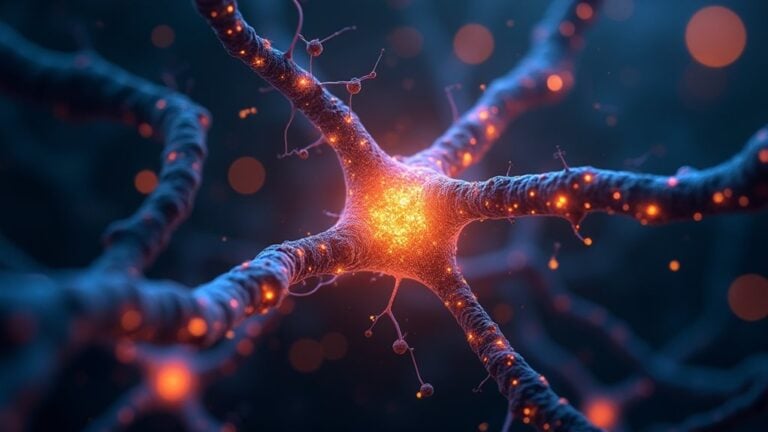Sleep plays a surprising yet powerful role in healing. As the body rests, it shifts into repair mode, releasing growth hormones that mend tissues, reduce swelling, and ease discomfort. Deep sleep stages boost immune function, while consistent rest helps muscles recover faster. Poor sleep, on the other hand, can slow healing and worsen pain. The right habits—like sticking to a schedule or keeping the room dark—can turn sleep into a secret weapon for recovery. But how exactly does it work?
It Should All Be in English.1. the Science of Sleep and Tissue Repair
While the body rests at night, it’s far from inactive—deep sleep triggers the release of growth hormones that repair muscle and tissues. This critical phase supports recovery by reducing inflammation and boosting immune function, allowing damaged cells to heal.
As sleep duration falls short, these processes stall, leaving tissues vulnerable. A consistent sleep schedule ascertains the body completes multiple sleep cycles, optimizing repair time. The sleep environment also plays a role; dark, quiet spaces encourage deeper rest. Interrupted rest disrupts growth hormone release, slowing tissue repair.
Prioritizing 7-9 hours of uninterrupted sleep fosters efficient recovery, while poor rest habits weaken the body’s ability to fight inflammation. Balanced sleep isn’t just restorative—it’s foundational for healing.
How Growth Hormones Accelerate Healing During Sleep
Deep sleep isn’t just about feeling rested—it’s when the body kicks its healing into high gear. During these critical hours of rest, the brain releases growth hormones, which play a key role in physical repair and recovery. This process is especially crucial after injury, as it fuels the body’s ability to rebuild damaged tissues.
- Hormone Surge: The pituitary gland releases growth hormones in deep sleep, speeding up tissue repair.
- Enhanced Blood Flow: Increased circulation delivers oxygen and nutrients to injured areas, aiding recovery.
- Optimal Recovery Time: Longer, uninterrupted sleep guarantees maximum growth hormone production, boosting overall health.
Without enough deep sleep, the body struggles to keep up with physical demands, delaying the recovery process. Prioritizing rest isn’t just about energy—it’s about giving the body what it needs to heal.
Sleep’s Impact on Inflammation and Pain Management
Many people underestimate how much sleep influences inflammation and pain, but the connection is undeniable. Sleep plays a critical role in managing these issues, as quality sleep each night helps regulate the body’s inflammatory response.
Chronic sleep deprivation disrupts this balance, increasing pain sensitivity and delaying recovery. Getting enough sleep allows the body to produce natural painkillers and anti-inflammatory compounds, which are indispensable for healing.
The importance of sleep extends beyond just feeling rested—it directly impacts overall health and wellbeing, especially during the recovery from an injury. Poor sleep quality can worsen inflammation, making discomfort harder to manage.
Prioritizing rest isn’t just about energy; it’s an essential part of healing. Without proper sleep, the body struggles to repair itself, prolonging pain and slowing progress.
Optimizing Sleep Quality for Faster Recovery
Sleep isn’t just about feeling refreshed—getting high-quality rest makes a real difference in how quickly the body bounces back from injury or strain. Sleep plays a pivotal role in repair, and the amount of sleep needed for optimal recovery falls between seven and nine hours of quality sleep each night.
Poor sleep, however, can slow healing and weaken physical and mental health. To guarantee adequate sleep, focus on these steps:
- Stick to a schedule: Going to bed and waking at the same time every day reinforces the body’s natural rhythms.
- Create a restful space: A cool, dark, and quiet environment promotes deeper sleep.
- Practice sleep hygiene: Avoid screens before bed and limit caffeine to improve sleep quality.
Consistency is key for recovery.
The Connection Between Sleep Cycles and Muscle Regeneration
Muscle restoration and nighttime rest go hand in hand, with each phase of sleep playing a unique role in the recovery process. Sleep plays a pivotal part in muscle repair, especially during the deeper stages of sleep when the body releases growth hormones. These hormones help rebuild tissues damaged during exercise or injury, allowing the body to recover faster.
Non-REM sleep, in particular, is when the most significant healing occurs, as it boosts blood flow and nutrient delivery to muscles. Without enough quality sleep, the body struggles to complete these processes, slowing injury recovery. This is why sleep is so essential—it gives the body the time and resources it needs to heal. By prioritizing rest, individuals can support their natural recovery and maintain stronger, healthier muscles.
Practical Strategies to Enhance Sleep for Injury Recovery
Although injuries can slow the body down, improving sleep quality can speed up healing. Sleep plays a pivotal role in recovering tissues, as blood flow increases and the heart rate slows during deep rest. Lack of sleep makes it harder for your body to repair itself, so prioritizing quality hours of sleep is essential.
- Stick to a schedule: Consistent bed and wake times regulate the body’s internal clock, aiding physical therapy efforts.
- Wind down with calming activities: Gentle stretching or meditation before bed signals the body to relax.
- Optimize the sleep environment: A cool, dark room with minimal distractions supports uninterrupted rest.
These steps help the body focus on healing, ensuring better recovery results.
Conclusion
Sleep silently strengthens the body’s healing superpowers. By balancing hormones, battling inflammation, and rebuilding tissues, deep rest repairs damage and revives resilience. Prioritizing peaceful, consistent sleep schedules speeds recovery, soothes pain, and sharpens the body’s natural repair processes. For faster healing, welcome rest—it’s the simplest, strongest strategy to restore strength and vigor.




